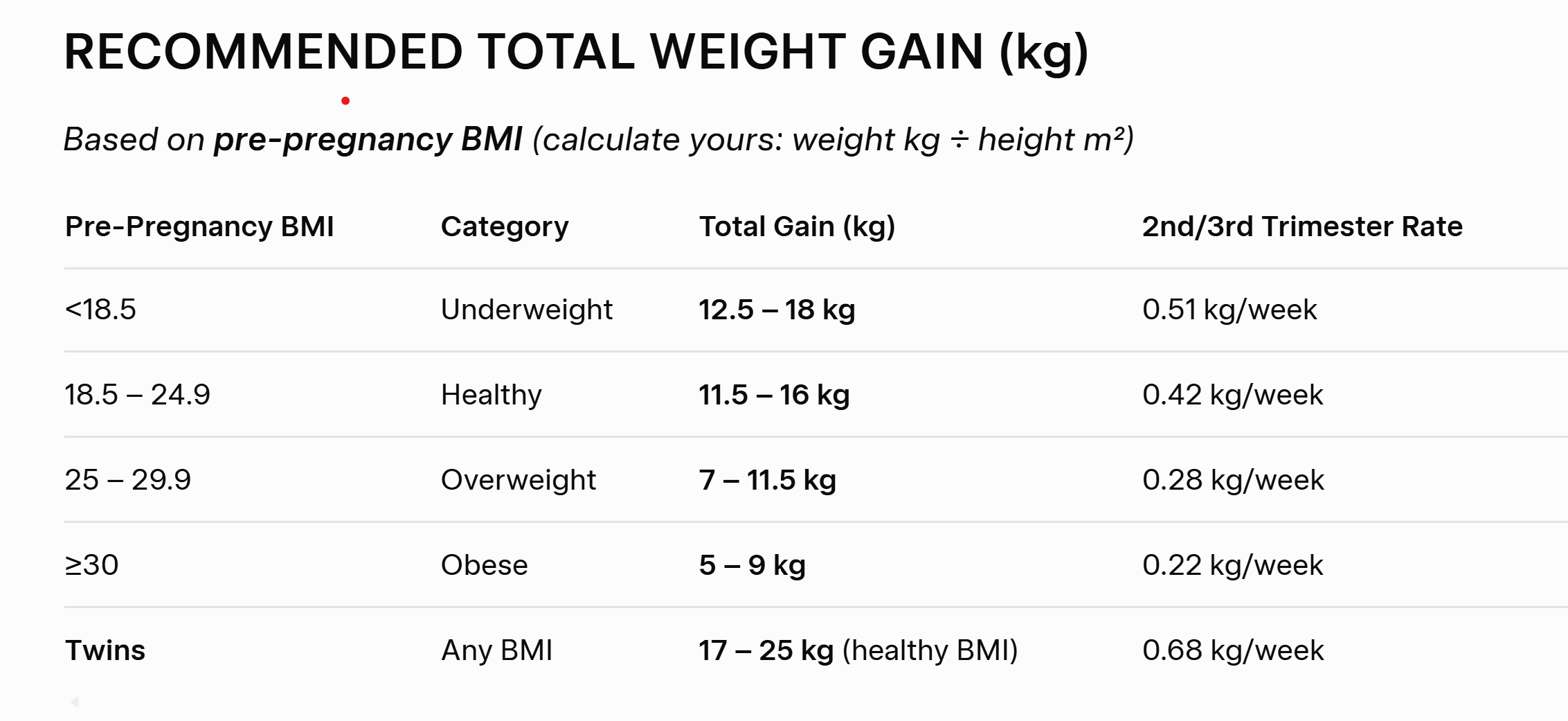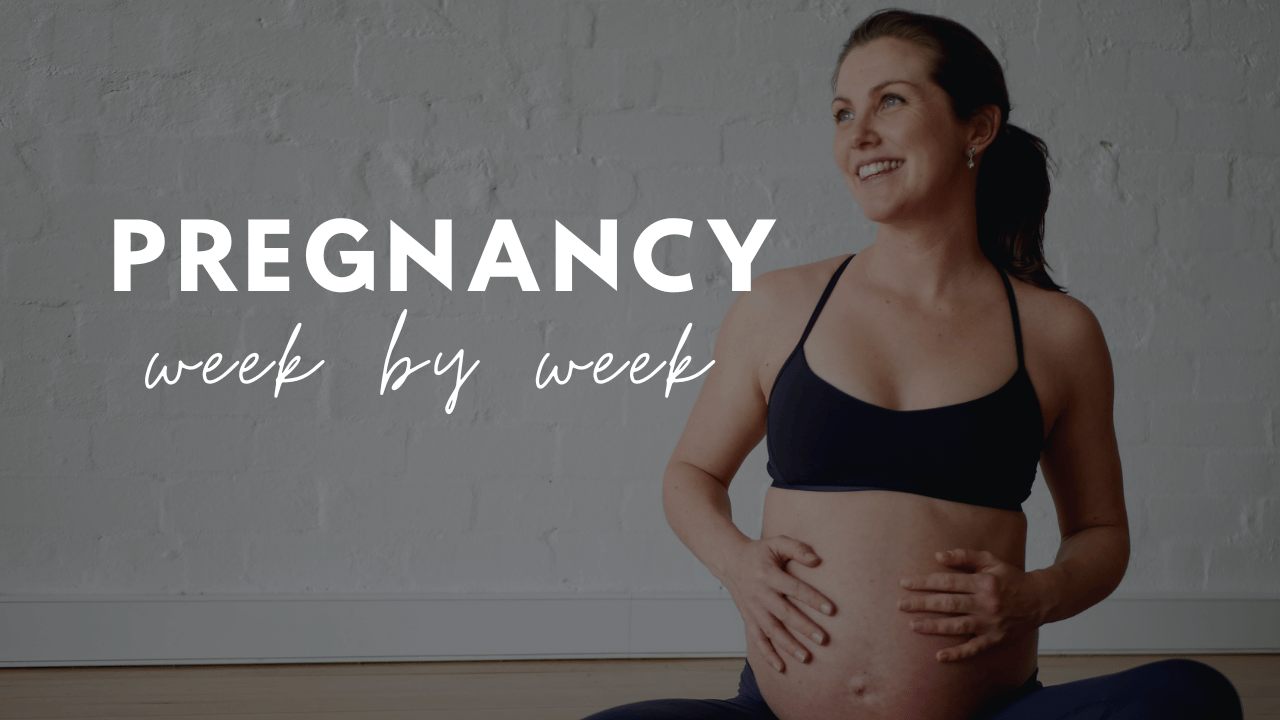How Much Weight Should I Gain During Pregnancy?
How Much Weight Should I Gain During Pregnancy?
Here is the evidence-based guide to weight gain during pregnancy - straight from ACOG, RANZCOG (Australian guidelines), IOM, and the latest meta-analyses.
Join me as I share my personal journey of gaining weight during pregnancy as well as some tips for all mamas.
Throughout my online program I discuss the physical and emotional challenges I faced, the changes in my body, and the adjustments I made to embrace this beautiful phase of life.
In this video, you'll find:
1. My weight gain experience and how it affected me mentally and physically.
2. Tips on maintaining a healthy mindset while navigating pregnancy weight changes.
3. Practical advice on nutrition and exercise that worked for me.
4. Insights into the importance of self-love and body positivity during pregnancy.
Whether you're expecting or just curious about the journey of pregnancy, I hope my story resonates with you and provides valuable insights.
Weight gain during pregnancy is normal as your baby grows.
What's not ideal if you are excessively underweight or overweight. Extremely overweight women tend to have more health problems.
You may even lose weight during the first few months of your pregnancy. This is especially true if you have morning sickness.
Most pregnant women will gain between 11.5 kg and 16 kg.
How much weight gain during pregnancy you experience will be influenced by:
1. Your weight before you were pregnant.
2. If you're carrying twins.
3. If you have morning sickness.
4. Your lifestyle.
Weight Gain during Pregnancy Guidelines

Source: RANZCOG 2025 + IOM 2009
Trimester Breakdown for Weight Gain (Healthy BMI)

What You Choose to Eat is Very Important.
You need to get the right nutrients for both you and baby. But what you eat will also have a direct impact on your weight.
Calories per day consumed impacts on your weight gain or weight loss.
But you don't have to 'eat for two.' Our Dietitian Carla explains this in a detailed video you can watch at the top of this post.
Every pregnant woman gains weight differently so there are no official guidelines for how much weight you should gain.
The most important thing is to keep your weight gain to a safe and healthy level for you and your baby.
Is it normal for an overweight woman to lose weight during pregnancy?
If you entered pregnancy overweight, then you may find yourself losing weight during pregnancy.
Why?
Well, there may be various reasons for this weight loss. It could be you are eating less. Eating healthier foods. Or from morning sickness affecting your appetite.
Talk to Your Doctor
First, I want you to talk with your doctor or midwife about what’s right for you when it comes to your health care.
Every woman and every pregnancy is different. They will measure your body mass index or BMI.
Discuss any sudden, dramatic changes in your weight. It could indicate an underlying problem or health issue.
Pregnancy is not the time to start or continue a weight loss diet. The restriction of calories and nutrients can be harmful to both you and baby.
So please, follow a pregnancy-appropriate healthy, well-balanced diet and to exercise plan.
When Should I See My Doctor?
Your weight and the growth of your baby should be tracked at each prenatal visit. Please talk to your doctor about your weight to avoid pregnancy complications.
Call your doctor if you have any symptoms such as:
1. Headaches
2. Dizziness
3. Shortness of breath
4. Loud snoring
5. Rapid heartbeat
Weight loss in Early Pregnancy
Weight loss in early pregnancy may occur due to nausea and loss of appetite. As you move through the second and third trimesters you will gain weight.
Your body uses more calories during pregnancy. If you eat a healthy and nutritious diet without increased caloric intake, then you can maintain a healthy weight.
When pregnant, your body will provide your baby with the nutrition they require to grow. Your body may resort to using fat stores to keep you going which may result in weight loss.
Morning Sickness and Weight Loss
The dreaded morning sickness can cause weight loss during the first trimester. Vomiting can cause you to lose your appetite and therefore eat less.
If you are overweight, there is no need to start worrying about weight loss hurting your baby. Losing some unwanted weight may be helpful to your health.
Are You Losing Weight during Pregnancy?
Most women don't think about losing weight when pregnant. After all, you have a growing baby inside. You need to get the recommended amount of food and pregnancy nutrients.
If you are clinically overweight or obese, you may lose weight in early pregnancy. This is due to stored fat being used to power pregnancy growth.
While a little loss of weight early in pregnancy is not uncommon, excessive weight loss can be a sign of something more serious.
For example; it could be a sign of hyperemesis or thyroid dysfunction. If you continue to lose weight, talk to your doctor.
Weight Loss Later in Pregnancy
Weight loss later in pregnancy can be more concerning. It could be due to; preeclampsia, poor baby growth, low amniotic fluid, pregnancy-induced hypertension.
Maintaining a Healthy Weight
A prenatal Dietitian or your doctor will be able to recommend the best diet tips for you.
1. Take your daily prenatal vitamins.
Your doctor will be able to recommend a prenatal vitamin for you. Not all are the same so please seek advice.
2. Eat healthy foods.
If you are having trouble eating, try eating smaller meals.
3. Stay hydrated.
Drinking water when pregnant is very important. You do not want to get dehydrated.
What Trimester do You Gain the Most Weight?
The answer is the third trimester of pregnancy.
Why?
Because your baby changes most rapidly during your third trimester of pregnancy. As a result, your body will also go through significant changes to support your growing baby.
This is Me at 13 Weeks Pregnant

This is Me at 31 Weeks Pregnant

This is Me at 37 Weeks Pregnant

Complications of Weight Gain
There are some complications associated with too much weight gain such as:
1. Gestational diabetes
2. High blood pressure
3. Premature birth (baby is born at 37 weeks or earlier)
4. Heavy birth weight
5. Back pain
What about Rapid Weight Gain?
As you enter your third trimester, your baby gains the most weight.
Why am I gaining weight?
1. a larger uterus
2. the placenta
3. baby weight
4. fluids
5. more blood
6. amniotic fluid
7. fat stores
Managing Your Weight Gain
You can help put on the right amount of weight by:
1. Eating a healthy, nutritious diet.
2. Participating in a prenatal exercise program.
3. Avoiding unhealthy fatty and sugary foods and drinks.
Along with eating healthy foods, you should know which foods to avoid when pregnant. There are some healthy foods that are not recommended when pregnant.
Make sure you know which foods to avoid during your pregnancy.
What Causes Excessive Weight Gain during Pregnancy?
If you were excessively over-weight before pregnancy, you have an increased risk of various complications.
Also, if you gain too much weight during pregnancy, it can increase the risk of health problems in your baby.
Poor diet, medical issues (hypothyroidism or polycystic ovary syndrome), some medications or lack of exercise can all lead to excessive weight gain.
How Can Excess Pregnancy Weight Gain Be Treated?
You can maintain a healthy weight by:
1. Eating a healthy diet.
2. Getting regular exercise.
3. Avoiding alcohol.
Only some of the weight you gain in pregnancy will be body fat.
The other things causing weight gain will include:
1. your baby.
2. your growing breasts.
3. the placenta.
4. the amniotic fluid.
5. the increased blood you need.
6. natural fluid retention.
Pregnancy Weight Guidelines
When it comes to your ideal pregnancy weight, and how much weight you should gain, talk to your doctor.
These numbers below are a guideline so if you're not in the range don't start stressing! Every pregnancy is different and you have your own unique challenges.
Your goal is to continue to pursue a healthy pregnancy weight through eating healthy and nutritious foods. As well as participating in my prenatal workouts.
How Many Kilos Should a Pregnant Woman Gain?
As your baby grows, it's normal to gain weight during your pregnancy.
Generally, most women gain between 11.5 kg and 16 kg.
However, how much weight you gain can be influenced by:
1. Your weight before you were pregnant.
2. If you're carrying twins.
3. If you have morning sickness.
4. Calories per day you consume.
If you gain too much weight, or do not gain enough, than what is recommended; then it can have health implications for both you and your baby.
Too much weight gain increases the risk of gestational diabetes. This is why you can take your body mass index (BMI).

ACOG say that:
1. If you're underweight (BMI under 18.5)
Your recommended total pregnancy weight gain is 28 to 40 pounds.
In the second and third trimesters, aim to gain about a pound (1 to 1.3 pounds to be exact) per week.
2. If you're average weight (BMI of 18.5 to 24.9)
Your recommended total pregnancy weight gain is 25 to 35 pounds.
In the second and third trimesters, aim to gain about a pound or a little less (0.8 to 1 pound to be exact) per week.
3. If you're overweight (BMI of 25 to 29.9)
Your recommended total pregnancy weight gain is 15 to 25 pounds.
In the second and third trimesters, aim to gain a little over a half pound (0.5 to 0.7 pounds to be exact) per week.
4. If you're obese (BMI of 30 and above)
Your recommended total pregnancy weight gain is 11 to 20 pounds.
In the second and third trimesters, aim to gain about a half pound (0.4 to 0.6 pounds to be exact) per week.
5. If you're 13 weeks pregnant with twins
Your recommended total pregnancy weight gain is 37 to 54 pounds. In the first half of your pregnancy, aim to gain about a pound per week.
In the second half, aim to gain a little over a pound per week.
As always, consult your doctor regarding your pregnancy weight if you have a concerns.
Takeaway
You should chat to your doctor about your weight gain, and they will monitor this for you. Don't compare yourself to your pregnant friends as we are all different.
You can maintain a healthy pregnancy weight by living a healthy lifestyle, participating in prenatal workouts and eating a healthy diet to ensure you are getting your prenatal nutrients.







